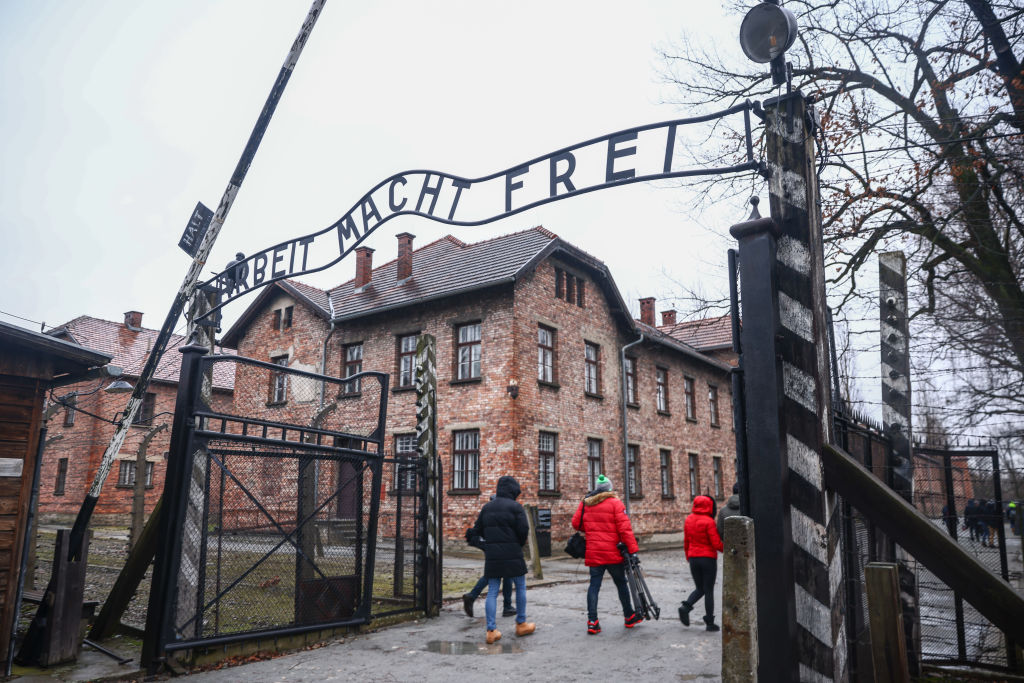“How many of you have known, or met, or listened to a Holocaust survivor?” I recently asked the Cornell University undergraduates in my class on antisemitism in the courts and in jurisprudence. All 16 hands went up. “You are the last generation,” I then told them, “to have had that privilege.”
[time-brightcove not-tgx=”true”]
Over the course of the past 80 years, ever since the Red Army liberated the Auschwitz-Birkenau death camp in what had been German occupied Poland, the women, men and children who had been persecuted, oppressed, tortured, and marked for destruction as part of Nazi Germany’s “Final Solution of the Jewish question” assumed the mission of telling the world how their families, their friends, and their neighbors had been murdered.
With the survivors dwindling all too rapidly from the scene, we are at a pivotal moment in determining how their memories can be passed on to those who have never had—and will never have—the opportunity to listen to the tales of all those who bore and are still bearing witness.
Both my parents survived Auschwitz and the Nazi concentration camp of Bergen-Belsen in Germany where they were liberated. In September 1945, my mother, then Dr. Ada Bimko, a Jewish dentist from the Polish city of Sosnowiec, was the principal witness for the prosecution at the first trial of Nazi war criminals. In the dock before a British military tribunal in the German city of Lüneburg were the SS officers and guards who had run Bergen-Belsen, many of whom had previously served at Auschwitz-Birkenau.
My mother, who had been imprisoned for 15 months in Birkenau followed by five months in Bergen-Belsen, told the tribunal that upon her arrival at Birkenau on the night of August 3, until August 4, 1943, she was separated from her parents, her first husband, and her child who were sent directly to be killed in a gas chamber. She was subsequently assigned to work as a doctor in the camp’s infirmary.
In what was one of the earliest, public accounts of the dispassionate cruelties at Auschwitz, she recalled how “the sick Jews” in the infirmary “were ordered to parade quite naked” in front of an SS doctor. “The seemingly weak people were put aside at once,” she said, “but other times the doctor looked also at the hands or at the arms and any small sort of thing which caught his attention was sufficient for him…Sometimes they pointed with a finger to one or the other, pointing out that those may join those people who were condemned to death.”
I feature my mother’s testimony in my courses at Cornell and Columbia—I also teach about the law of genocide at the law schools of both universities—primarily because of its intrinsic importance, but also because it serves to give my students a direct link, through me, as my mother’s son, to the genocide that was the Holocaust.
Read more: Why I’ll Never Stop Sharing My Holocaust Story
The late historian Lucy Dawidowicz once described my father, the fiery leader of the survivors in the British Zone of Germany after the end of World War II, as “our Ancient Mariner, who passes, ‘like night, from land to land,’ with ‘strange power of speech’ to tell his tale to whomsoever will listen.”
Remembrance is only meaningful if it has a purpose. And that purpose must be rooted in an understanding of precisely what we enjoin ourselves to remember and why.
In formally designating January 27, the date that Auschwitz was liberated in 1945, as an annual international day of commemoration, the United Nations General Assembly reaffirmed that the Holocaust must “forever be a warning to all people of the dangers of hatred, bigotry, racism and prejudice.”
One other central, if not overriding, purpose of Holocaust remembrance, however, must be to think of the millions who were annihilated not as impersonal statistics but as individuals with names, faces, identities, dreams, and emotions. The survivors told us about their parents and grandparents, their spouses, their siblings, their children, their friends, their neighbors who died of starvation in ghetto streets or of typhus in a concentration camp barrack, or whose corpses rose toward heaven from a crematorium. We cannot allow these dead to fade into the ether of oblivion.
Each of us, in turn, must now commit to transmit into the future at least one name and one face. For me, that name and face belong to Benjamin, my mother’s five-and-a-half-year-old son. Since my mother’s death in 1997, Benjamin has existed inside of me. I see his face in my mind, try to imagine his voice, his fear as the gas chamber doors slammed shut, his final tears. If I were to forget him, he would disappear. And I must make sure that he will not disappear with me.
We, the survivors’ children and grandchildren, who grew up with them, knowing them, feeling their pain and experiencing their joys, have absorbed their memories into ours. In a very real sense, we have become their attesters. Our task and the task of all of us who have known, or met, or listened to a Holocaust survivor must be to ingrain these memories—the survivors’ legacy to the world—into the permanent consciousness of humankind.

